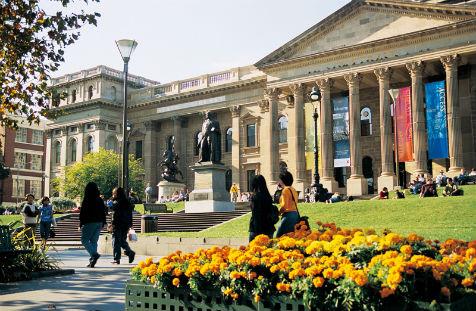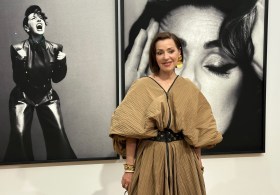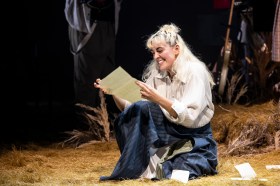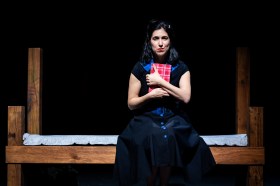Who’s responsible for upholding Melbourne’s UNESCO City of Literature status?
Imagine books spilling out of phone booths, vacant shop-fronts devoted to pop-up studios for writers, and billboards splashed with six-word stories.
These are just some of the ideas pitched at the recent Melbourne Writers’ Festival City of Literature forum. Joining Festival Director Lisa Dempster, Scottish writer Doug Johnstone, and writer and artist Matt Blackwood were an audience dedicated enough to brave the Sunday morning session.
Those that did were introduced to some inspiring examples of how Melbourne can best exemplify and live up to its UNESCO City of Literature designation. Phone booths in which you could dial a number and get a story on the end of the line? Awesome – as were many of the propositions likely being traded right now over Twitter.
When Melbourne was awarded the UNESCO City of Literature designation in 2008, it was a bit like waking up to discover you had superpowers. What do you do with them? Well you celebrate, and rightly so. At the time, the Victorian capital was only the second such city in the world behind Edinburgh to make the grade (though there are now four more) and everyone was very chuffed.
As Dempster commented at the forum, there are almost nightly book and magazine launches in Melbourne, and the city is revered for its wealth of quality publishers, writers and writing courses. Couple that with the cornerstone of the City of Literature designation, the Wheeler Centre, which bundles the city’s literary offerings like Robotham paperbacks on Father’s Day, and it’s all pretty self-explanatory. Melbourne is a City of Literature.
So why are we talking about it five years after the designation and three years after the Wheeler Centre opened its doors?
Because we’re not doing enough, according to Blackwood, who points out that the designation isn’t a given and there’s nothing to say it can’t be taken away. Querying the forum about how they felt upon receiving the designation, there were a few murmurs of pride, but Blackwood indicated that he was angry.
A pioneer of locative literature, Blackwood has long been sewing streets with words, often tying technology, art and literature together. Primarily concerned with how our sense of place can be altered and enhanced by narrative, his work suits the highly visual initiatives proposed at the forum. That’s not to say his propulsion of the discussion isn’t altruistic, if his online presence is anything to go by he’s definitely the scribe most dedicated to cementing the designation.
Blackwood believes that the city’s honour should mean as much to us as it does to him. Seemingly, it doesn’t; indeed, a few people in the forum admitted that they didn’t even realise Melbourne was an official City of Literature. Though this was announced by recent implants to the city, it’s not an uncommon revelation amongst life-long Melburnians.
Speaking about Edinburgh, the beloved eldest child of the City of Literature family, Johnstone highlights the variety of writing-themed events happening across the Scottish capital, where maps are available for self-guided tours of literary landmarks, making it a place that when people leave ‘they know that Edinburgh is a City of Literature’.
This is perhaps why Blackwood showed slides of a parking garage in Kansas City that moonlights as a giant bookcase. Kansas City ain’t no City of Literature, so why don’t we have any such structures to indicate our status? The notion raises an important consideration; does increased visibility ensure increased engagement?
While some people don’t realise Melbourne is a City of Literature, those that do are highly aware – so contends a librarian in the crowd. The city’s proliferation of literary proclivities, as earlier outlined by Dempster, demonstrates fervent engagement, and much of this is happening in libraries via reading groups, workshops, talks and live events (not to mention being mirrored in bars and bookstores).
This assertion is undoubtedly true, yet the relevance of libraries remains white-knuckled against the digital surge, barely keeping its head above cultural redundancy. Why then, if people aren’t using libraries for these activities, do we need further City of Literature initiatives that would presumably encourage the kind of behaviour already happening?
Perhaps because libraries are facing an image crisis more profound than Miley Cyrus. They’re too wholesome – what they offer doesn’t cut it in our current cultural landscape – and they’re still unsure how best to reinvent themselves. While they struggle to adapt to the digital age, and deal with broader issues like a lack of policy on Public Lending Rights for e-books, visitors aren’t engaging, not as they historically have. Or at least not in the numbers of City of Literature supposes.
This is where Blackwood believes the City of Literature initiatives can step in. While proposing that ‘libraries are the spine’ of any such engagement, people aren’t frequenting libraries, they’re frequenting bus stops and train stations, public places and everyday spaces. These are the sites that he wants the City of Literature to invigorate, where it can inspire and engage via everyday occurrences.
Targeting transport hubs and systems seems another tactic behind much of the City of Literature discussion. There’s an underlying suggestion that literary billboards and book vending machines at train stations would expose the culturally endangered enclaves outside the CBD to the joys of reading. Blackwood flags Carrum Downs as one such place in need of a literary floatation device.
All amazing ideas, but like using spectacles to hide your secret identity, there’s a few seriously simple considerations that can shoot them down. How Melbourne fulfils its heroic duty as a City of Literature has all the implications of donning spandex – whose responsibility is it, and who is going to pay for it?
Blackwood suggests that all local councils need to get on board, perhaps by pooling a small portion of their cultural budgets, but as one man in the audience drolly observes, ‘People are more interested in getting a big wheelie bin’. When it comes down to using taxpayer money to build pretty sculptures made from books, it’s not that easy to get everyone onside.
Of course, no one wants to hear this, and this one audience member played the devil’s advocate perfectly, suggesting that a private company is set up to generate the cash necessary to implement these ideas, perhaps by charging people to borrow from one of these phone-booth libraries.
‘There’s a need for things to happen but where’s the responsibility?’ Dempster asked after baulking at the suggestion that the Melbourne Writers Festival (or she personally) somehow take the reins.
Karen Monaghan, a member of the MWF board in attendance, proposed that the Rookies, (that is, the young attendees of 17-year-old blogger and editor Tavi Gavinson’s workshop the previous day) somehow take the torch. These kids ain’t got no cash, so that’s unlikely at the moment, but it’s possible they might be inspired to implement a successful strategy in the future.
Of course, for the Rookies to impact the physical landscape in the ways that the City of Literature initiatives seem obsessed, they’re going to have to get onto city council. Citizen-powered programs can only go so far, and they’re at their logical boundaries (though it’s rightly pointed out that the City of Literature has no official online presence yet – another frontier).
We the people are already doing what we’re most capable of – going to book launches and trivia nights, buying and writing books, subscribing and submitting to journals, surrendering Sunday sleep-ins for forums.
The responsibility and the cost outside of those things lies with the people the UNESCO designation should be most important to – the City of Melbourne. They’ve set aside a pretty paltry $135,000 to ‘kick start’ a City of Literature Office in the 2013-14 draft budget, which was released in early May.
There’s still no word on whether it’s passed, but as the Sunday morning turnout at the MWF forum proves, the discussion is going on with or without city council. Perhaps Cr Watts should’ve sacrificed her Sunday and shared her slideshow of ideas.
Check out Blackwood’s list of City of Literature initiatives here, and join the conversation on Twitter with the hashtag #CityofLiteratureInitiative
(Pictured:The State Library of Victoria)





